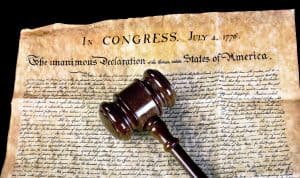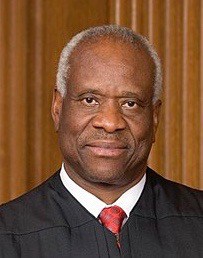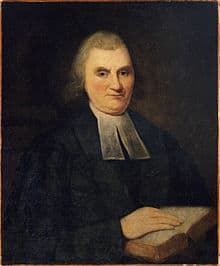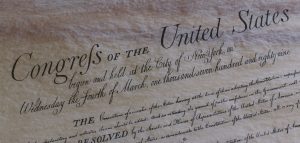The 4th of July is the first great fact in your nation’s history — the very ring-bolt in the chain of your yet undeveloped destiny. Pride and patriotism, not less than gratitude, prompt you to celebrate and to hold it in perpetual remembrance. I have said that the Declaration of Independence is the ring-bolt to the chain of your nation’s destiny; so, indeed, I regard it. The principles contained in that instrument are saving principles. Stand by those principles, be true to them on all occasions, in all places, against all foes, and at whatever cost.
—Frederick Douglass, in a speech delivered July 5, 1852 titled “What to the Slave is the Fourth of July?”1—
This article is part 3 of a 3-part series mining ten bedrock principles of liberty embedded in the Declaration of Independence. In part 1 we reviewed some of the events that led to the adoption of the Declaration of Independence in early July of 1776, and in part 2 we highlighted and discussed four of the ten truths we are endeavoring to consider. These initial four are as follows.
-
-
- God exists, has established an ordered and moral universe, and holds humanity accountable.
- Absolute truths exist and are knowable.
- God and His laws establish the track on which men and nations must travel to attain happiness, fulfillment, and greatness; and to reach their God-given potential.
- God has created human beings equal in value, and He intends for them to be treated with dignity and respect.
-

Ours is not an exhaustive list, by any means. Yet it is a substantive list. We now are ready to move ahead to consider Principles 5 through 10. You can go here to read Jefferson’s original draft of the Declaration, and here to compare and contrast the original to the final version.
Principle 5: Rights are inherent and God-given and are rooted in God’s having created members of the human race in His own image.
Last time, in our discussion of principle 2, we cited a quote from Alvin Schmidt where, citing Gary Amos, Schmidt points out that the meaning of the word self-evident alludes to the truth that God creates people in His image. God’s bestowing rights on all human beings provides additional affirmation of this truth.
Once again, we see that equality among members of the human race isn’t achieved by government intervention; rather, it is granted by God at creation. People and governments are responsible to recognize this equality as inherent, and the two most important ways they can do this are by 1) recognizing and 2) protecting unalienable rights. Citizens must have the freedom and liberty to pursue their dreams. For individuals, this means affirming the dignity of all and not thwarting the efforts of others to reach their God-given potential. For government, it involves protecting people’s efforts to achieve, accomplish, produce, and yes, build wealth. It is the job of the government
-
-
- to keep citizens from hindering other citizens’ efforts to achieve, and
- to refrain from hindering them itself.
-

The rights the Declaration identifies — “Life, Liberty and the pursuit of Happiness,” tell us much about the kinds of rights the Founders recognized. They did not affirm a “right” to happiness, but the right to pursue it! Nor did they uphold a “right” to “income equality,” “reproductive health,” or even healthcare in general. Americans today apparently are unaware that these are qualitatively different from the rights the Founders identified.
“Life, liberty, and the pursuit of happiness” are what social scientists call “negative rights.” To enjoy them, individuals themselves must be free to act in unhindered ways. On the other hand, “positive rights” are “achieved” through government manipulation, a process that tramples all over the negative rights of others and that flies in the face of government’s God-given, limited role.2 Like it or not, this was the Founders’ perspective. (Truthfully, the better we understand it, the better we like it, and, in fact, the more we fall in love with it!) This perspective—of upholding and protecting negative rights—has been a major reason America became the greatest, freest, most civil, most powerful, most benevolent, and most prosperous nation on earth.
America’s Founding Fathers did not affirm a “right” to happiness, but the right to pursue it! There is a qualitative difference between these two. The former is a positive “right” and the latter a negative one. Through the Declaration of Independence, America’s Founders upheld the validity, not of positive rights, but of negative ones.
Principle 6: Equality as used by Jefferson and the rest of the Founders refers to equality of worth and affirmation of natural opportunities, not to equality of outcomes achieved by government manipulation of outcomes, opportunities, or both.
This principle elaborates on the fifth principle. The Founders correctly saw equality as being at the “front end” of people’s lives rather than the “back end,” a place at which people arrive only after government has orchestrated and rearranged the playing field.
This latter concept of equality is consistently 1) elusive, 2) unsatisfying, and 3) a poison that kills people’s personal incentive to work and achieve. Despite this, you’ll find many advocates for this concept of equality among those contending for so-called “social justice” today.
Principle 7: Rights are inextricably linked to God’s laws.
We spoke of the role of God’s laws in contributing to human happiness and freedom in our discussion of the third principle; here we tie God’s laws to individual, inherent rights. Try to comprehend how far we have departed from the Founders’ view of rights! I could name many so-called “rights” Americans have petitioned government to grant them, and in many if not most cases, government has complied—in direct violation of the Founders’ view of rights, the Declaration of Independence, and the Constitution of the United States. One prime example is the “right” to “marriage equality” or “same-sex ‘marriage.'”
Mark it down! Same-sex “marriage” affirms homosexuality as being on par with heterosexuality and defies everything we know intuitively about what marriage is and ought to be. (See the Word Foundations article titled “God’s Definition of Marriage is Self-Evident.”) Recognition of a same-sex relationship as a marriage or a potential marriage was, is, and forever will be a blatant violation of “the Laws of Nature and of Nature’s God.”
Recognition of a same-sex relationship as a marriage or a potential marriage was, is, and forever will be a blatant violation of “the Laws of Nature and of Nature’s God.”
Principle 8: Government does not grant rights but has the responsibility to recognize, maintain, and protect them.
Read carefully this portion of Clarence Thomas’s dissent in Obergefell, the June 26, 2015 Supreme Court ruling that mandated same-sex “marriage” nationwide.

The Court’s decision today is at odds not only with the Constitution, but with the principles upon which our Nation was built. Since well before 1787, liberty has been understood as freedom from government action, not entitlement to government benefits. The Framers created our Constitution to preserve that understanding of liberty. Yet the majority invokes our Constitution in the name of a “liberty” that the Framers would not have recognized, to the detriment of the liberty they sought to protect. Along the way, it rejects the idea—captured in our Declaration of Independence—that human dignity is innate and suggests instead that it comes from the Government. This distortion of our Constitution not only ignores the text, it inverts the relationship between the individual and the state in our Republic. I cannot agree with it.
Since well before 1787, liberty has been understood as freedom from government action, not entitlement to government benefits.
—Supreme Court Justice Clarence Thomas—
The “right” to same-sex marriage was carved out of emotional appeals and myths; it was fabricated by government manipulation and exploitation. No such “right” is unalienable; it is bestowed by government, regulated by government, and subject to government whims.
Let us also understand this specifically about the Court’s redefinition of marriage. With Obergefell, elitists moved natural, man-woman marriage itself under its own jurisdiction. If government can grant rights, then it can twist them, reshape them, manipulate them, and even take them away. This is tyranny, and it is a form of tyranny that is even worse than the oppression our forebears opposed and fled. Justice Thomas understands as do far too few just how contrary to America’s founding principles Obergefell is.

Same-sex “marriage” and other “rights” created by government elites are based on what the late Francis Schaeffer called “arbitrary absolutes.” Because the imposition of arbitrary absolutes is unbiblical and constitutes tyranny, Christians must oppose these and similar actions. Our opposition must include, but cannot be limited to, our upholding 1) biblical truth in the form of the Founders’ perspective on rights as unalienable and fixed (see Principle 5), as well as 2) contending for the Founders’ belief that absolute truths, including right and wrong, exist and are knowable (see Principle 2).
Dr. Schaeffer contended that no government that acts to impose its own version of morality on society can amiably coexist with citizens who hold them accountable by pointing to bedrock, immutable truths. The early church faced a similar scenario when its members refused to worship Caesar as lord because they knew only Jesus was and is Lord. In America the confrontation won’t be one about actively worshiping government elites as deities, but leftist tyrants will demand allegiance nonetheless. Just ask Barronelle Stutzman. Christians must actively oppose “the tyranny of the elites” early and in an ongoing way. If they don’t, their inaction will amount to surrender and a forfeiture of religious and economic freedom. Schaeffer offers a sentence for his readers to memorize. “To make no decision in regard to the growth of authoritarian government is already a decision for it.”
To make no decision in regard to the growth of authoritarian government is already a decision for it.
—Francis Schaeffer—
Unfortunately, Obergefell is but one of several Supreme Court rulings in recent decades that have violated the letter, spirit, and intent of the Declaration of Independence. Roe v. Wade and Doe v. Bolton, both permitting abortion, are two others. How can a Supreme Court decision that sets the stage to take life be consistent with an unalienable right to life? It can’t! Learn more here.
How can a Supreme Court decision that sets the stage to take life be consistent with the unalienable right to life? It can’t!
Principle 9: Government has limited authority.
Principle 9 overlaps with Principles 8 and 10, but it deserves to be treated as a separate item on the list. The Declaration of Independence puts it eloquently, yet powerfully and clearly.
- First, government’s role is to secure or protect “unalienable rights,” rights given by God.
- Second, government’s powers are derived “from the consent of the governed.”
- Third, the power of government is to be “just.”
The inclusion of the ideal of limited government in the Declaration of Independence was no accident. First, to the discerning mind, this makes perfect sense. Liberty can thrive in a nation, and the people’s inherent rights can be preserved, only if government’s powers are bridled. Second, during the time leading up to the American Revolution, a consensus had been growing that a king’s, or government’s, authority was not unlimited. We turn once more to Francis Schaeffer. In his landmark work, A Christian Manifesto (1981), Dr. Schaeffer explains,

John Witherspoon, a Presbyterian minister and president of what is now Princeton University, was the only pastor to sign the Declaration of Independence. He was a very important man during the founding of the country. He linked the Christian thinking represented by the College of New Jersey (now Princeton University) with the work he did both on the Declaration of Independence and on countless very important committees in the founding of the country. This linkage of Christian thinking and the concepts of government were not incidental but fundamental. John Witherspoon knew and stood consciously in the stream of Samuel Rutherford, a Scotsman who lived from 1600-1661 and who wrote Lex Rex in 1644. Lex rex means “law is king”—a phrase that was absolutely earthshaking. Prior to that it had been rex lex, the king is law. In Lex Rex he wrote that the law, and no one else, is king. Therefore, the heads of government are under the law, not a law unto themselves.
Lex rex means “law is king”—a phrase that was absolutely earthshaking. Prior to that it had been rex lex, the king is law. In [his book] Lex Rex he [Samuel Rutherford] wrote that the law, and no one else, is king. Therefore, the heads of government are under the law, not a law unto themselves.
—Francis Schaeffer—
Principle 10: When government oversteps its authority and begins to achieve ends contrary to those it was established and designed by God to accomplish, the people have a right and even a duty to hold it accountable.
This even includes abolishing a tyrannical government and replacing it with one that will fulfill its God-given duty to protect inherent rights. The Declaration affirms,
“[W]henever any Form of Government becomes destructive of these ends, it is the Right of the People to alter or to abolish it, and to institute new Government, laying its foundation on such principles and organizing its powers in such form, as to them shall seem most likely to effect their Safety and Happiness.
Note that not only does the people’s happiness depend on their holding government accountable. Their safety does as well!
Go here for a list of all ten principles on one page.
Epilogue
Americans have wandered so far away from the ideals enshrined in the Declaration that, in the name of rights, many are working relentlessly to destroy the very foundation of liberty the Founders laid and sacrificed their wealth and their blood to maintain.

A July 1, 2019 article titled “Declaration of Independence still inspires activists,” paints a picture of a real scenario that contrasts sharply to the one that occurred in Philadelphia in early July at the Pennsylvania State House, what we now know as Independence Hall.
Shauna Marie O’Toole is a transgender activist who has organized and attended countless rallies and lobbied New York State lawmakers for legal protections. Convinced that “no amount of science” would win over opponents, she decided that an “emotional statement” was needed, one drawing upon words as rooted as any in American history.
“We hold these truths to be self-evident,” O’Toole wrote, “that all people, regardless of race, gender, religion, immigration or economic status, sexual orientation or gender identity, are created equal, that they are endowed by their government with certain unalienable Rights, that among these are Life, Liberty and the pursuit of Happiness.’”
Can you spot the flaws in Shauna Marie O’Toole’s attempt to “translate” the words of the Declaration of Independence into a modern-day appeal? Can you see the tyrannical place to which her rhetoric will lead? Sure, it’s emotional—but it isn’t rooted in reality or truth.
The primary strength of the Declaration of Independence is that it is, and has been, rooted in truth. Noble, lofty, idealistic—yes, absolutely—but resting on, and rooted in, bedrock truth. Will you do your part to help others understand this?
American liberty depends on it.
A list of all ten principles we have considered in this series is available here.
Related article: Recapturing the Spirit of ’76
Copyright © 2019 by B. Nathaniel Sullivan. All rights reserved.
Notes:
1In his speech, Douglass “roundly criticizes Americans for saying they promote natural rights and equality before the law while still abiding legalized chattel slavery,…[yet still affirms and] celebrates the United States’ ideals and calls Americans to live up to them by abolishing slavery.”
2See item 4 on this page.


[…] To continue reading, go here. […]